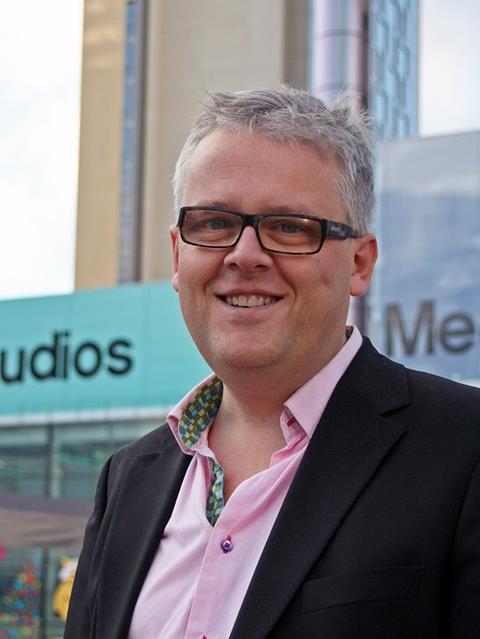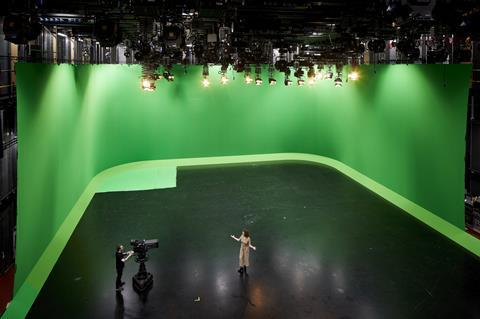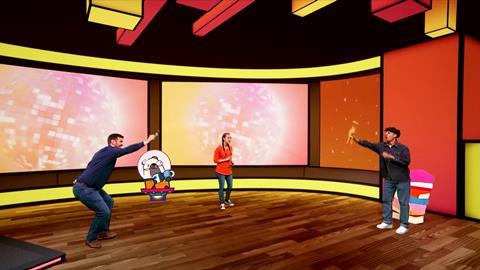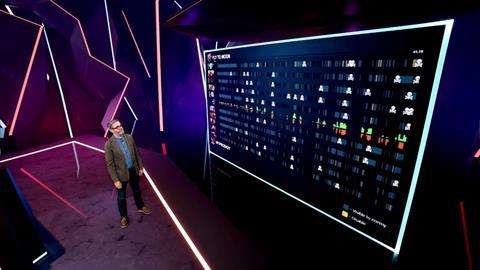 Sponsored content
Sponsored content
Match of The Day, BBC Bitesize and Weavr among the productions using dock10’s revolutionary facilities
The new virtual studio capability at dock10 is now being rolled out for use in entertainment shows. The UK’s first major studio to adopt the latest next generation virtual studios technologies, dock10 has been putting the system through its paces, starting in earnest with the BBC’s football coverage around Match of The Day, as well as BBC Bitesize and Weavr the revolutionary new way for fans to engage with esports.
Over recent months, the studio has also been working with producers to deploy the system on even more genres beyond sport. Projects include a children’s programme, a game show pilot and a live entertainment production.
As the home of many much-loved shows, including The Voice UK, Who Wants To Be A Millionaire, Countdown, and CBBC’s Blue Peter, dock10 is well placed to see how virtual studios might make a difference to entertainment shows.

“The early adopters of this tech are seeing what they can achieve,” says dock10 Head of Studios Andy Waters. “They’re going into commissioners and including it as part of a pitch.”
The virtual studio system works by using a green-screen studio space, replaced in real time with a photo realistic virtual set. Productions either replace the whole set, or use the green-screen or LED walls to replace specific areas, combining physical and virtual elements.
Existing sets created in any 3D modelling package can be imported into the system and a wide range of pre-made assets can be easily sourced, adapted and added into the design. Augmented reality can then add an extra twist.
dock10’s virtual studios service is part of a £5million investment into its facilities, announced just over a year ago. “We recognised that advancements in real time rendering technology could be used to drive a significant leap forward for virtual studios, with the ability to build otherwise impossible sets,” says Waters.
The virtual studio set-up uses the latest camera tracking and real-time rendering technology to create the photorealistic set. The tracker technology creates a real depth of field so that a presenter’s exact location in the virtual studio is perfectly set in relation to virtual objects.
Realism is delivered by adding in small details such as shadows, reflections, and perspective angles. Even the thinnest physical objects, such as a sub-pixel strand of hair, are perfectly keyed so as not to shatter the illusion of reality.
BBC Sport has used the tech to great effect. On a typical Saturday, the studio at dock10 is first set up for Football Focus at midday; then a few hours later it’s transformed for Final Score; in the evening it changes again, for Match of the Day. With the VR service this means pretty much the same set in the same studio, but with three different looks.
dock10 is also part of a consortium behind the Weavr initiative, a UK government-backed esports innovation project that sets out to redefine the way audiences engage and interact with global esports using immersive technologies such as virtual reality, mobile augmentation and virtual studios.
Over the last few months, the dock10 studios team has been developing the service to give entertainment formats an extra dimension. “Let’s say you’ve got a daytime game show, for very little it’s suddenly looking like prime-time Saturday night,” says Waters.

Or an entertainment show with spin-off, behind-the-scenes or interview segments could brand each segment differently, but using the same space and with speedy turn-around. Meanwhile, transportation and storage bills go down, while sustainability credits go up.
The set-up allows shows to appear much larger, giving small sized studio spaces the impression of being a bigger space such as a full-sized stadium. It also gives productions the ability to develop, innovate and change their studio output more regularly allowing them to evolve and refresh their sets on an ongoing basis.
As well as innovating a state-of-the-art virtual studios system, dock10 also hired a specialist team, including virtual studio developers and coders. Working with a traditional set designer, these experts can discuss the options and feed into a designer’s creative realization.
“Whereas you’d previously have created the set on paper and sent it to a company to make from wood, timber and plastic, we’re building it out of pixels,” says Waters.
For most shows the best solution is to blend virtual and real. Where there are audiences, the actual set needs to give them a sense of place. At the same time, the audience can view the full set with its virtual elements, via monitors, so they can see how it actually looks and what’s happening in the production’s virtual world.
Along with a virtual studio comes the possibility of augmented reality and ‘conjuring’ objects on set. This could mean game show contestants ‘wearing’ the score on their heads or an AR character doing a live phone interview. AR can “take the roof off the box” says Waters, creating a world where there was once a studio ceiling.

Using wide shots, it’s possible give the impression of a city-scape, blue sky and clouds or night-time star constellations; these stars could then fall form the sky and appear as floating AR objects within your new virtual set.
All this might sound like an added expense, but dock10’s experience has given them an idea of how the VR service can cut production costs. It speeds up turn-around times and can save on more expensive elements. Instead of a game show investing in a large LED wall, you could place a standard studio monitor in the studio for the host, while the output shows a giant, high spec wall.
“It’ll be a great tool for game shows, not only to make your pound go a bit further in terms of the look, but it allows you some quite crazy creative choices,” says Waters.
For producers, VS and AR is still largely unfamiliar ground. “What we’re finding is that producers often need to see it, feel it and be in the studio,” says Waters. So, dock10 has been hosting demos and it is also incorporating the technology into pilots made under its free pilot scheme.
“Producers might not understand what is possible, so we see it as part of our responsibility, to let producers know about virtual technology and what they can achieve.”


























